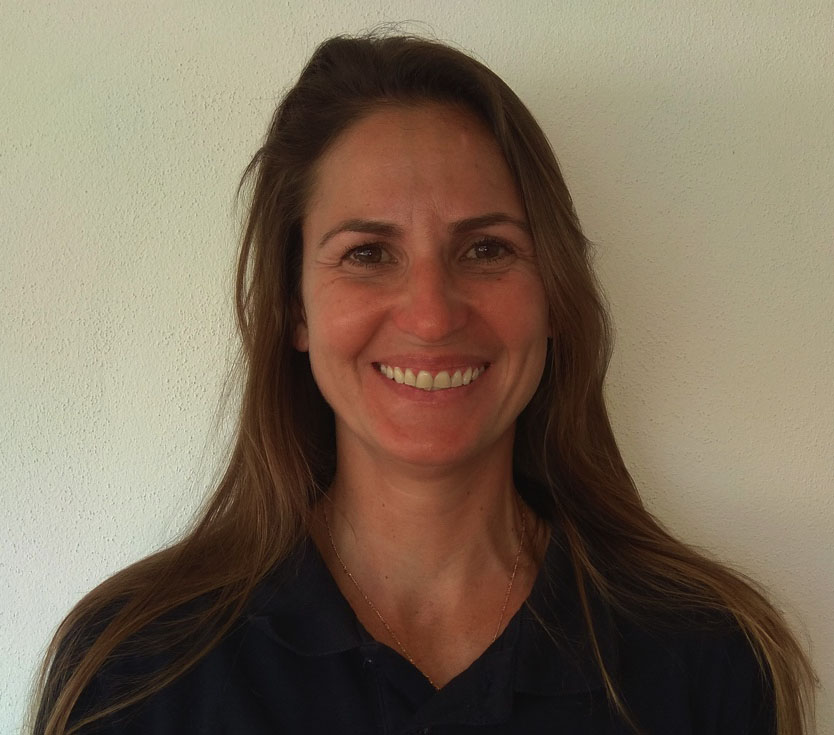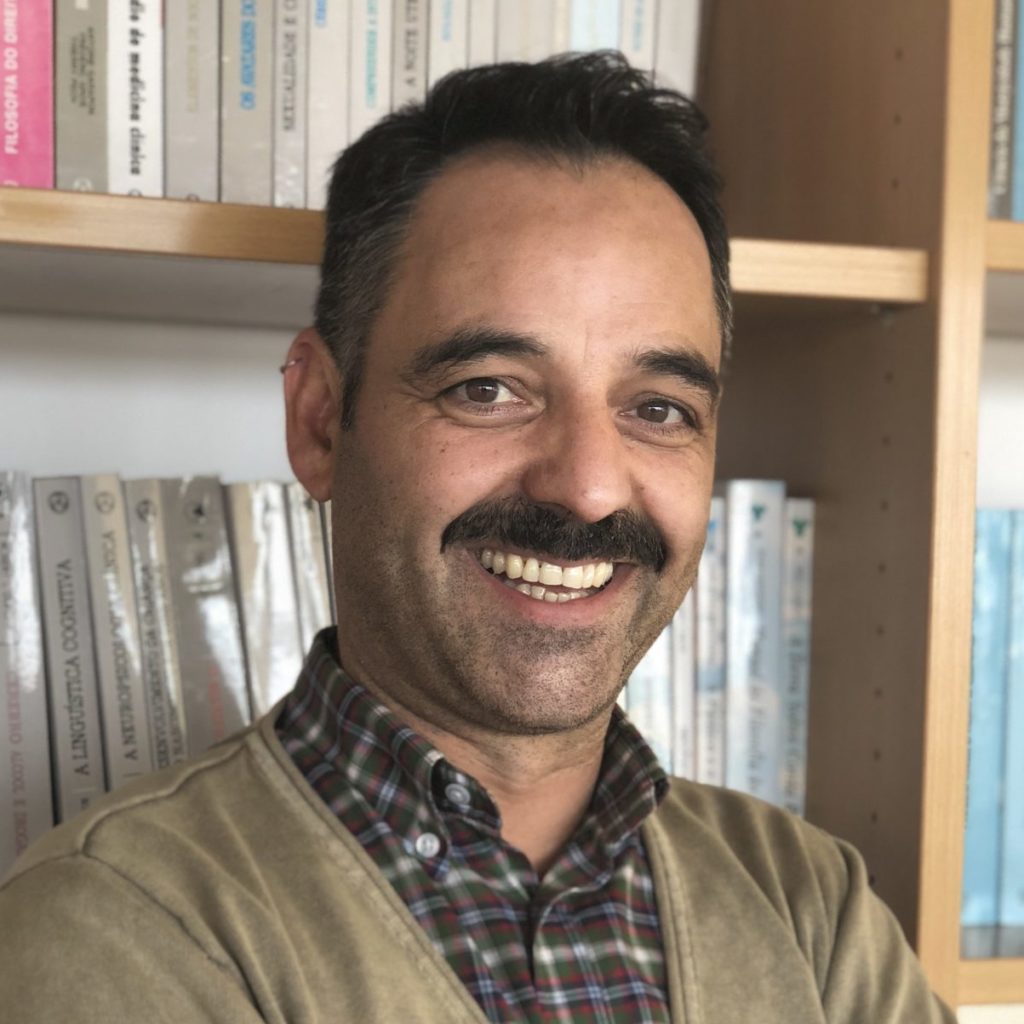Available at
Silves (Algarve)

Beatriz Minghelli
Available at
Vila Nova de Gaia (Oporto)

José Luís Sousa
Available at
Viseu
Susana Barata
1st Year
| UC – 1st Semester | CH | ECTS | UC – 2nd Semester | CH | ECTS | |
| Anatomophysiology I | 40 T | 20 PL | 6 | Anatomophysiology II | 40 T | 20 PL | 6 | |
| Cell Biology and Genetics | 30 T | 20 PL | 5 | Anthroposociology and Fieldwork | 20 T | 20 TC | 3 | |
| Biomechanics | 40 TP | 5 | Epistemology and Science Systems | 30 T | 2 | |
| Biochemistry and Biophysics | 30 T | 30 TP | 5 | Methods and Techniques of Evaluation and Intervention in Physiotherapy I | 100 TP | 10 OT | 9 | |
| Introduction to the Profession | 30 T | 20 TC | 10 OT | 4 | Models and Methodologies of Intervention in Physiotherapy | 40 TP | 10 OT | 5 | |
| First Aid and Reanimation | 20 T | 20 PL | 3 | Human Movement | 30 T | 20 PL | 5 | |
| Information and Communication Technologies | 30 TP | 2 |
2nd Year
| UC – 1st Semester | CH | ECTS | UC – 2nd Semester | CH | ECTS | |
| Statistics | 50 TP | 4 | Clinical Teaching I | 130 E | 20 OT | 13 | |
| Ethics and Deontology | 30 T | 3 | Methods and Techniques of Evaluation and Intervention in Physiotherapy III | 60 TP | 10 OT | 4 | |
| Orthopaedic and Traumatological Physiotherapy | 20T | 30 PL | 10 OT | 6 | Evolutionary and Functional Neuroanatomy | 50 T | 4 | |
| Methods and Techniques of Evaluation and Intervention in Physiotherapy II | 110 TP | 10 OT | 10 | Pathology II | 50 T | 3 | |
| Pathology I | 60 TP | 4 | Health Psychology | 30 T | 3 | |
| Developmental Psychology: Epigenesis and Life Cycles | 40 T | 3 | Psychokinetics | 40 TP | 10 OT | 3 |
3rd Year
| UC – 1st Semester | CH | ECTS | UC – 2nd Semester | CH | ECTS | |
| Clinical Teaching II | 350 E | 20 OT | 21 | Cardiorespiratory Physiotherapy I | 20 T | 30 PL | 10 OT | 5 | |
| Neurological Physiotherapy | 20T | 30 PL | 10 OT | 5 | Geriatric and Continuing Care Physiotherapy | 30 TP | 10 OT | 5 | |
| Methods and Techniques of Evaluation and Intervention in Physiotherapy IV | 60 TP | 10 OT | 4 | Physiotherapy in the Community | 40 TP | 10 OT | 5 | |
| Research Methods | 30 TP | 10 OT | 3 | ||||
| Methods and Techniques of Evaluation and Intervention in Physiotherapy V | 80 TP | 10 OT | 9 | ||||
| Personal Portfolio (1) | — | 3 | ||||
(1) – Personal portfolio – CU available at the School or portfolio project – choose one unit.
4th Year
| UC – 1st Semester | CH | ECTS | UC – 2nd Semester | CH | ECTS | |
| Entrepreneurship and Management in Health Services | 30 T | 10 TP | 2 | Clinical TeachingIII | 520 E | 40 OT | 26 | |
| Cardiorespiratory Physiotherapy II | 20T | 30 PL | 10 OT | 5 | Research in Physiotherapy II | 8 S | 20 OT | 4 | |
| Physiotherapy Applied to Specific Conditions | 40 TP | 10 OT | 5 | ||||
| Pediatric Physiotherapy | 20 T | 30 PL |10 OT | 5 | ||||
| Research in Physiotherapy I | 10 TP | 20 OT | 4 | ||||
| Methods and Techniques of Evaluation and Intervention in Physiotherapy VI | 80 TP | 10 OT | 9 | ||||
UC – Curricular Unit | CH – Workload | ECTS – ECTS Credits | T – Theoretical | PL – Practical and Laboratory | TP – Theoretical/Practical | SE – Seminar/Internship | OT – Tutorial
Admission requirements
Successful applicants are admitted through one of the following competitions:
- Institutional Competition: completed secondary education and one of the following entrance exam groups:
- Biology and Geology
- Biology and Geology + Physics and Chemistry
- Biology and Geology + Portuguese
- Special Competitions:
- Change of Institution/Course
- Readmission
- International Student
- Special Conditions Regimes: see the DGES site.
Diploma Requirements
A successfully concluded Undergraduate Degree in Physiotherapy requires completion of a study program of 240 mandatory ECTS credits.
Consequently, Licenciado degree holders in Physiotherapy acquire the skills and competences necessary to:
- Identify structures, functioning, regulation and homeostasis of human body and the return mechanisms to function and the improvements of the health status;
- Describe the normal human movement, identify constraints and deviations from the normality, and enumerate the mechanisms that lead to its regulation, identifying the main problems and planning appropriate interventions;
- Identify and interpret national and international law in the SC and health areas;
- Apply the model and evaluation methodology in Physiotherapy based on the International Classification of Functioning (ICF) model;
- Identify and apply methods and evaluation and intervention techniques in physiotherapy;
- Perform research and disseminate the results;
- Rehabilitate different functional conditions in real contexts, efficiently, performing assessment and reassessment reports, with measurement results;
- Exercise clinical practice, efficiently, in different contexts of providing health care/services.
Accreditation / Evaluation
Silves
- Accredited by the A3ES – Portuguese Higher Education Evaluation and Accreditation Agency
- Published: 10/02/2017
- Decision of the A3ES Board of Directors
V. N. Gaia
- Accredited by the A3ES – Portuguese Higher Education Evaluation and Accreditation Agency
- Published: 09/02/2017
- Decision of the A3ES Board of Directors
Viseu
- Accredited by the A3ES – Portuguese Higher Education Evaluation and Accreditation Agency
- Published: 10/02/2017
- Decision of the A3ES Board of Directors
Career Opportunities
Career opportunities for Licenciado degree holders in Physiotherapy include jobs and positions in:
- Hospitals;
- Public and private clinics and health centres;
- Rehabilitation centres;
- Spas and other thermal establishments;
- Sports structures;
- Special education schools and institutes;
- Institutions for the elderly.
Professional Title
The qualification gives access to the professional title of Fisioterapeuta, included in the professional career of Técnico de Diagnóstico e Terapêutica.
Escola Superior de Saúde Jean Piaget em Silves
Registado da DGES nr: R/A-Ef 175/2011/AL02, publicado em DR pelo Aviso n.º 9822/2017, de 24 de agosto.
Escola Superior de Saúde Jean Piaget em Viseu
Registado na DGES com o nr: R/A-Ef 183/2011/AL02, publicado em DR pelo Aviso n.º 9884/2017, de 25 de agosto.
Escola Superior de Saúde Jean Piaget em V. N. Gaia
Registado na DGES com o nr: R/A-Ef 180/2011/AL02, publicado em DR pelo Aviso n.º 9753/2017, de 23 de agosto.
4 years / 8 semesters • Total = 240 ECTS Credits
Further studies
Licenciado degree gives access to postgraduate studies in terms and under the conditions of the currently valid legislation.
Study area
Physiotherapy
Assessment
The purpose of the student’s assessment is to evaluate his/her achievements in the acquisition and development of knowledge and competences defined in the Curricular Units syllabi.
Thus, assessment methods and instruments are adapted to the specific objectives, characteristics and contents of the corresponding Curricular Unit, and assessment is carried out in accordance with the currently valid Attendance and Assessment Regulations.
There are two main types of assessment: Continuous Assessment, which assesses the student’s work over an academic period (semester / quarter / year), e.g. his/her participation in the Curricular Unit activities, individual and/or group assignments, oral and written tests, etc., and Assessment by Exam, which assesses only the student’s performance at the exam he/she sits for.
RAZÕES PARA ESTUDAR FISIOTERAPIA
- Acesso especial para detentores de CTeSP ou CET;
- Estágios Curriculares incluídos na propina nas principais áreas de especialização;
- Bolsas para Estudantes:
- com baixos rendimentos;
- com classificação acima dos 14 valores;
- Atletas Federados.


